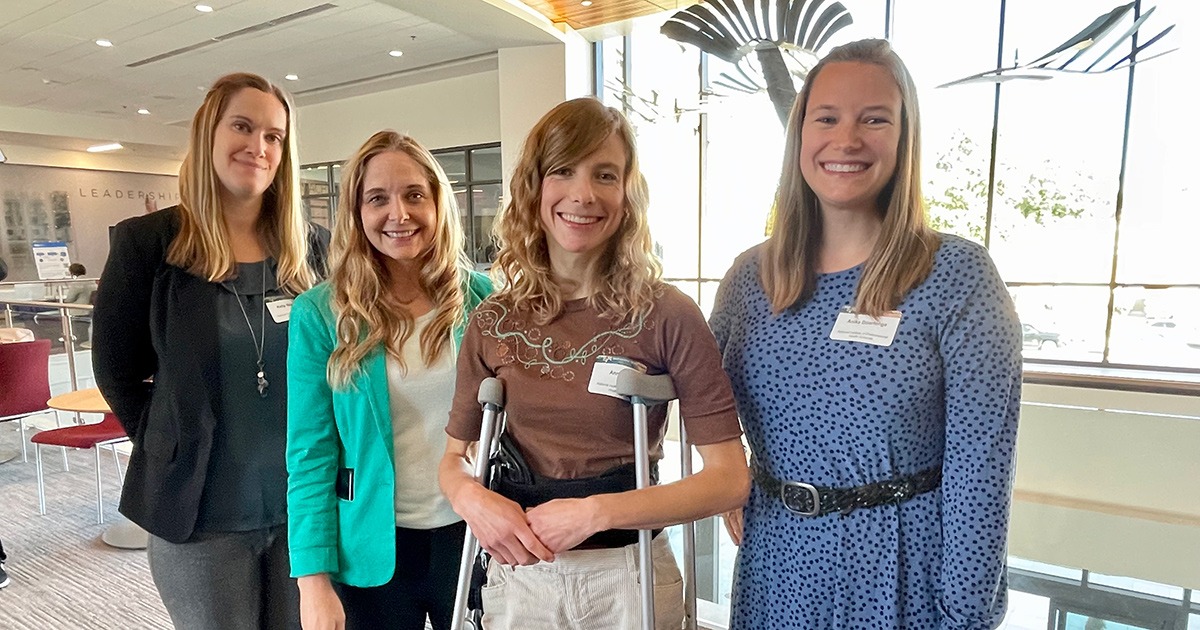Environmental epidemiology, citizen science, and the public health effects of climate change were among the topics highlighted at the North Carolina Society of Toxicology (NCSOT) annual conference, which was held Oct. 19 at North Carolina Central University (NCCU) in Durham.
The NIEHS presence was strong at the event, and the institute was well represented among the regional chapter’s leadership (see sidebar).
“I am incredibly proud of the NCSOT regional chapter executive committee for working so hard to organize this event,” said Kristen Ryan, Ph.D., NCSOT president and a toxicologist in the Division of Translational Toxicology (DTT) at NIEHS. “To the best of my knowledge, we had record breaking attendance. I am beyond excited to say that over half of the 217 attendees were trainees whom I could tell were excited to get back out and share their work after two years of virtual meetings.”
Ryan noted that the meeting set an NCSOT record for number of presentations. Seventy-five of the 118 trainees in attendance (50 undergraduate students, 47 graduate students, and 21 postdoctoral trainees) shared their work. She also expressed gratitude to the more than 30 NIEHS scientists and staff who served as judges for the trainee posters and talks (see sidebar for list of winners).
“I am sincerely grateful and thankful to be working at NIEHS and with people who care so much for the next generation of toxicologists and scientists,” Ryan added.
Climate change and public health
The intersection of climate change and toxicology, and how each affect public health, was the focus of the day’s events.
From wildfires to flooding, North Carolina’s diverse landscape endures it all. Such climate-related weather events leave communities in constant recovery mode, according to NIEHS grantee Jennifer Runkle, Ph.D, an environmental epidemiologist with the North Carolina Institute for Climate Studies. She researches the effects of climate change on mental health and maternal health.
Runkle noted that climate change can be addressed if interdisciplinary teams can come together and embrace uncertainty.
“Climate action has the potential to improve public health and advance health equity,” she said. “There are important research gaps that need to be addressed. We need diverse perspectives, community participation, and everybody coming to the table working together for this problem.”
Wildfire smoke toxicity
Smoke plumes caused by wildfires can increase exposure to fine particulate matter and irritant gases, according to NIEHS grantee Meghan Rebuli, Ph.D. She is a research assistant professor in toxicology and environmental medicine at the University of North Carolina (UNC) School of Medicine.
Rebuli, who researches how wood smoke exposures affect males and females differently, presented “Respiratory Health Effects of Wildfire Smoke.”
 Rebuli explained differences in gene expression between males and females following wood smoke inhalation exposures. (Photo courtesy of Jennifer Harker / NIEHS)
Rebuli explained differences in gene expression between males and females following wood smoke inhalation exposures. (Photo courtesy of Jennifer Harker / NIEHS)Wildfire exposures can lead to increased susceptibility to respiratory pathogen infection and inflammation, among many other health problems, Rebuli explained. Such exposures present challenges for toxicologists.
“Wildfires are involving more and more complex mixtures of exposures because of human infrastructure moving into wildland areas and fires burning more complex materials like tires, plastics, and household materials,” she said.
Citizen science
Applications (apps) on mobile devices can offer important scientific information to researchers studying the health effects of wildfires, according to Shu Yang, Ph.D., an associate professor of statistics at North Carolina State University (NCSU).
Yang’s presentation focused on NIEHS-funded research that involves an iPhone and iPad app called Smoke Sense, which is a citizen science project sponsored by the U.S. Environmental Protection Agency (EPA). The goal is to raise awareness and engage citizens about health risks caused by wildfire smoke.
 Yang explained how her team — which included Microsoft, EPA, and NCSU — used citizens’ self-reported data on health-related actions and outcomes related to wildfire smoke exposure. (Photo courtesy of Jennifer Harker / NIEHS)
Yang explained how her team — which included Microsoft, EPA, and NCSU — used citizens’ self-reported data on health-related actions and outcomes related to wildfire smoke exposure. (Photo courtesy of Jennifer Harker / NIEHS)Yang said people in affected areas can report whether they initiate health protection measures and report any symptoms they might experience following an exposure.
Harmful algal blooms
Other presentations included information and resources regarding harmful algal blooms.
- Dan Wiltsie, Algal Bloom Response Coordinator for the North Carolina Division of Water Resources, presented “Algal Bloom Response and Reporting Dashboard.”
- Donna Hill, D.V.M., a biologist and veterinarian in the EPA Office of Research and Development, presented “Toxins Associated with Fresh Water Harmful Algal Blooms and Their Mammalian Health Effects.”
- A lunch-and-learn session for undergraduate students titled “Toxicology: Past, Present, and Future” was presented by DTT Health Scientist Brandy Beverly, Ph.D.
“This year’s event has certainly set a high standard for our future annual meetings,” said Anika Dzierlenga, Ph.D., NCSOT vice president and scientific program director in the NIEHS Genes, Environment, and Health Branch. “One major takeaway is that undergraduate students are interested in learning more about toxicology, and our community of toxicologists are equally excited to share their knowledge and experience with the next generation. We hope to be able to amplify these activities and opportunities in the future.”
(Jennifer Harker, Ph.D., is a technical writer-editor in the NIEHS Office of Communications and Public Liaison.)
Source link
factor.niehs.nih.gov


